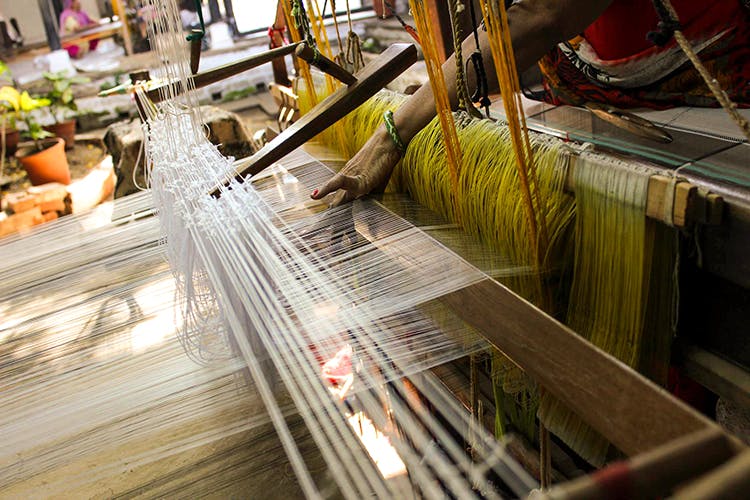Almost every state in India has its very own version of the six yard splendour; the sari. Woven with threads of gold, or made from strands of cotton, or adorned with traditional motifs painstakingly hand-stitched by artisans —the sari has many stunning avatars. LBB criss-crosses the country to find you the places you need to travel to for their saris, with a generous dose of travel and wanderlust thrown in.
Up For A Sari-Shopping Binge? Check Out These 10 Textile Hubs In India
Kanchipuram
Possibly the grandest of them all, the Kanjivaram is a stunning showcase of silk and zari. In the bustling, heritage town of Kanchipuram in Tamil Nadu, entire families have immersed themselves in the art of weaving fine, mulberry silk, with coarse silk threads dipped in silver or gold.
Head to shops on Gandhi Road to buy the finery. Once a capital of the Pallava kingdom, Kanchipuram is a holy town and considered to be one of the seven places in India you can attain nirvana at in Hinduism. Sightseeing here is all about temple-hopping; the Kailasanatha Temple from the Pallava period stuns you with its intricate stone-work, while the Ekambareswarar Temple is one of five major temples in South India dedicated to Lord Shiva.
Best Time To Visit: Sep – Mar
Nearest Airport: Chennai
Mysore
Since the time of Tipu Sultan, Mysore has been a renowned producer of silk, and even today, the district produces 70 per cent of the country’s mulberry silk. If you are travelling through towns around Mysore {like Ramanagaram, for example}, you’ll pass by many houses with traditional cocooning units. In the city of Mysore, you can even stop by the Government Silk Factory and witness the resplendent saree in the making.
A tourist favourite, Mysore is a city of palaces, temples, and colonial buildings. Do visit the Mysore Palace that was once the seat of the Wodeyar dynasty; its ornate interiors will bowl you over. As will the Jaganmohan Palace, Lalitha Mahal and the Chamudeshwari Temple.
Best Time To Visit: Oct – Feb
Nearest Airport: Bangalore
Benares
Opulent is the word that best describes the Benaresi sari. Embellished with heavy brocade, the intricate work on a Benaresi sari can sometimes take over six months to complete. Floral and leaf motifs are common, and you can pick up saris made in pure silk, georgette, organza, and shattir.
Now known as Varanasi, the town of Benares is shrouded in mysticism, and is the holiest of places in Hinduism. The banks of the River Ganges serve as the ghats where pilgrims come to perform religious rituals, and make for a colourful sight. You can also navigate the narrow lanes of the town to discover ancient forts, temples {around 23,000 of them, actually}, and mosques {some of them, like the Alamgiri Mosque, dates back to the Mughal era}.
Best Time To Visit: Oct – Mar
Nearest Airport: Varanasi
Chanderi
Chanderi, it is said, took root in the Vedic period, and was brought to life by Lord Krishna’s cousin, Shishupala. Whatever the accurate version of the story might be, we surely know that the art of the Chanderi weave is centuries-old; embraced and encouraged by the royal families through the ages. Lightweight and marked by a luminescent gold shade, the Chanderi is woven from silk, cotton, or silk cotton. Do drop by Chanderiya, a weaver’s collective, when on a visit; you can catch the artisans in action, and also pick up a few sarees while you’re at it.
Madhya Pradesh’s Chanderi is a town speckled by hills, forests and lakes, as well as historical forts and monuments. The graceful arches of Koshak Mahal, the 15th-century tomb of Mehrunissa {known as Shehzadi Ka Rauza}, and the recently restored {to its original glory} Chanderi Fort are all sights to behold.
Best Time To Visit: Oct – Mar
Nearest Airport: Gwalior
Bishnupur
Though Murshidabad, another district in West Bengal that’s known for its silk, was the birthplace of the famed Baluchari sari, it’s Bishnupur that almost exclusively produces it now. Made from silk, Baluchari saris feature pallus that depict scenes from the Mahabharata and Ramayana, setting them apart. The scenes are hand-stitched with two threads of different colours, and it takes around a week to make a single sari.
Apart from the saris, Bishnupur is famous for its terracotta temples. The handful of temples built during the 17th and 18th century, under the rules of the Mallas, are dedicated to Lord Krishna, and feature multi-lobed arches, towering domes and curved roofs.
Best Time To Visit: Oct – Mar
Nearest Airport: Kolkata
Kota
This town in Rajasthan became a textile paradise when Rao Kishore Singh, a general for the Mughals, brought in weavers from Mysore, somewhere around the 17th and 18th centuries. Since then, Kota has been producing a variety of saris, discernible by the checks made by being woven over a traditional pit.
At Kota, you can buy anything from plain, cotton saris to more ornate drapes featuring intricate dorai {thread} work.
Like the rest of Rajasthan, Kota is bestowed with stunning palaces, too. Drop by the City Fort Palace, a large, whitewashed complex that houses a durbar where you can gawk at the beautiful mirror work. There’s also an in-house museum worth checking out. The Jagmandir palace that sits pretty in the midst of the artificially created Kishore Sagar lake is another popular tourist spot. You can also visit the Ranthambore National Park and the historical city of Bundi from Kota.
Best Time To Visit: Oct – Feb
Nearest Airport: Jaipur
Maheshwar
According to the history books, Maheshwar has been a handloom producing centre since the 5th century. Crafted from cotton, Maheshwari sarees {many say that it was conceptualised by Queen Ahilyabai Holkar, who ruled these parts in the 18th century} are a vibrant display of contrasting colours, and often feature thick {sometimes floral} borders, checks and stripes. Today, under the patronage of the Holkar family, the Rehwa Society works with hundreds of weavers to produce the stunning Maheshwari saree.
By the banks of the river Narmada, Maheshwar is dotted by many monuments from when the Holkars ruled. The imposing Ahilya Fort {it’s been converted to a hotel} makes for a pretty sight from the outside. The lush-green Narmada Ghats and a handful of ancient temples are also worth dropping by.
Best Time To Visit: Aug – Mar
Nearest Airport: Indore
Karaikudi
Over a century ago, the Chettinad region of Tamil Nadu was famous for a weave called Kandangi, made from pure silk. While these silk sarees have faded away, their designs and intricacies have carried on over to the Chettinad cotton sarees Karaikudi is so famous for. Deep and earthy tones are the hallmark of Chettinad cottons, and weavers usually work in simple patterns like checks, stripes, and temple motifs.
A heritage town, Karaikudi’s mansions, antique-ware, and spicy cuisine add dollops of excitement to your trip. Home to the wealthy Nagarathar Chettiars, Karaikudi is bedecked with antiques and curios, and some of them, like the Chettinad Raja Palace, are even open to the public.
For all the details on Karaikudi’s many delights, go here.
Best Time To Visit: Oct – Feb
Nearest Airport: Madurai
Sambalpur
Made famous by former Prime Minister Indira Gandhi, the Sambalpuri sari is made in several handloom clusters in Orissa, including Sambalpur, Bargarh, Boudh and Balangir. The Sambalpuri Ikkat is a technique where the yarn threads are tied-and-dyed before the weaving process even begins, which is what makes the Sambalpuri sari so unique.
A major tourist attraction in Sambalpur is the Hirakud Dam, which is the world’s largest earthen dam along with being Asia’s largest artificial lake. The lake attracts many migratory birds in winters, so don’t forget to carry a pair of binoculars if you’re visiting during this time. In summer, the waters of the dam can be seen receding and uncovering a submerged temple.
The Leaning Temple of Huma just outside Sambalpur and the Debrigarh Wildlife Sanctuary are other attractions you can visit.
Best Time To Visit: Sep – Mar
Nearest Airport: Raipur
Sualkuchi
An out-an-out textile hub, Sualkuchi is the centre of Assam’s silk production. The town produces all three types of Assam silk; Muga {produced by a silkworm endemic to the state}, Pat {mulberry silk}, and Eri silk {where the silkworm feeds on the leaves of the castor oil plant}. Saris from here feature heavy floral work in reds, blacks, greens and yellows.
Sualkuchi is a town by the Brahmaputra River, where you can spend an hour or two taking in the scenery. The aging Sidheshwar Devalaya temple, the monastery of Hatisatra dedicated to Lord Krishna, and the pilgrimage centre of Hajo are perfect for some spiritual solace, we assure you.
Best Time To Visit: Nov – Mar
Nearest Airport: Guwahati

